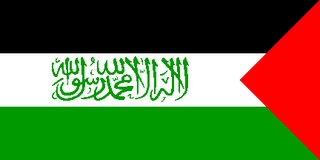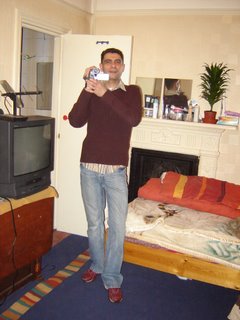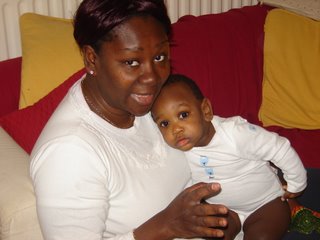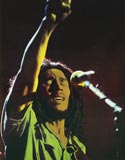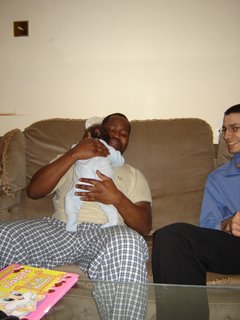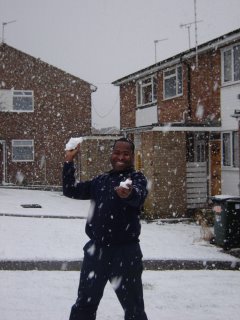Wednesday, March 29, 2006
Sunday, March 26, 2006
Prisoner 46664
"True reconciliation does not consist in merely forgetting the past".
"No one is born hating another person because of the color of his skin, or his background, or his religion. People must learn to hate, and if they can learn to hate, they can be taught to love, for love comes more naturally to the human heart than its opposite".

"The greatest glory in living lies not in never falling, but in rising every time we fall".
"I dream of the realization of the unity of Africa, whereby its leaders combine in their efforts to solve the problems of this continent. I dream of our vast deserts, of our forests, of all our great wildernesses". NELSON MANDELA.
I wonder what would have happened if in June 11 1964, instead of ending up in the infamous Robben Island prison, Nelson Mandela became president of South Africa. Would he have followed the path of those African leaders who fought hard the colonial occupation of our lands and once in power, oppressed and exploited their own people?
Or Would he have broken the mould by offering a real alternative to his people?
To spend 27 years in one of the toughest prisons, one needs resilience, courage, physical and psychological strength. Mandela proved beyond doubt that he's made of these qualities. But to be a great leader is a different ball game. Prisoner 46664, to a cetain extent, has benefiting from the Halo Effect. Does it mean because Mandela 'gave' 27 years of his life for his people he would have been a great leader? For leadership demands a different type of qualities and skills. According to the British scientific journal Nature Today leadership requires specific qualities such as : Initiative, vision, a good grasp of knowledge. Inner qualities such as: Impartiality, character, strength, ability to recognize one's limitations, faithfulness, kindness, people orientated, outspokenness, wisdom, proactiveness, honesty.
Other sources point out: hard working, communiction skills, openness to new idea, capability to listen to both sides, wise planning & common sense, ability to stand under adversity and praise, knowing the facts before making decisions, not penalising people for good behaviour and rewarding evil people, etc. Today, most leaders are picked on the basis of their good looks, wealth, popularity, and the willingness to do anything to get on top and stay there.
A lot of Africans, me included, have a deep emotional attachement to and absolute respect for Nelson Mandela. For he symbolises things Africans are longing for: Freedom and great leadership. In doing so, we have elevated prisonner 46664 to a saint-like status. Ascribing to him qualities he doesn't necessarily possess.
How would have Mandela fared in 1964 as president of South Africa?
Let's not forget that in half the period of colonial rule African leaders have destroyed the economy and political stability of their countries, violated the so-called human rights with imputity. They have turned against their own people. Those who recongnize their mistakes are unwilling to admit them. They created personality cults and reconfigured their country's map. Naming streets and public facilities such as airports, schools, stadiums and hospitals after themselves. Many have not only acquired monarchical tendencies such as printing their images on currencies while they are still alive but they have also turned themselves into deities that must be worshipped and glorified.
For the sake of my sanity, I wish to believe Nelson Mandela would have been different.
"No one is born hating another person because of the color of his skin, or his background, or his religion. People must learn to hate, and if they can learn to hate, they can be taught to love, for love comes more naturally to the human heart than its opposite".

"The greatest glory in living lies not in never falling, but in rising every time we fall".
"I dream of the realization of the unity of Africa, whereby its leaders combine in their efforts to solve the problems of this continent. I dream of our vast deserts, of our forests, of all our great wildernesses". NELSON MANDELA.
I wonder what would have happened if in June 11 1964, instead of ending up in the infamous Robben Island prison, Nelson Mandela became president of South Africa. Would he have followed the path of those African leaders who fought hard the colonial occupation of our lands and once in power, oppressed and exploited their own people?
Or Would he have broken the mould by offering a real alternative to his people?
To spend 27 years in one of the toughest prisons, one needs resilience, courage, physical and psychological strength. Mandela proved beyond doubt that he's made of these qualities. But to be a great leader is a different ball game. Prisoner 46664, to a cetain extent, has benefiting from the Halo Effect. Does it mean because Mandela 'gave' 27 years of his life for his people he would have been a great leader? For leadership demands a different type of qualities and skills. According to the British scientific journal Nature Today leadership requires specific qualities such as : Initiative, vision, a good grasp of knowledge. Inner qualities such as: Impartiality, character, strength, ability to recognize one's limitations, faithfulness, kindness, people orientated, outspokenness, wisdom, proactiveness, honesty.
Other sources point out: hard working, communiction skills, openness to new idea, capability to listen to both sides, wise planning & common sense, ability to stand under adversity and praise, knowing the facts before making decisions, not penalising people for good behaviour and rewarding evil people, etc. Today, most leaders are picked on the basis of their good looks, wealth, popularity, and the willingness to do anything to get on top and stay there.
A lot of Africans, me included, have a deep emotional attachement to and absolute respect for Nelson Mandela. For he symbolises things Africans are longing for: Freedom and great leadership. In doing so, we have elevated prisonner 46664 to a saint-like status. Ascribing to him qualities he doesn't necessarily possess.
How would have Mandela fared in 1964 as president of South Africa?
Let's not forget that in half the period of colonial rule African leaders have destroyed the economy and political stability of their countries, violated the so-called human rights with imputity. They have turned against their own people. Those who recongnize their mistakes are unwilling to admit them. They created personality cults and reconfigured their country's map. Naming streets and public facilities such as airports, schools, stadiums and hospitals after themselves. Many have not only acquired monarchical tendencies such as printing their images on currencies while they are still alive but they have also turned themselves into deities that must be worshipped and glorified.
For the sake of my sanity, I wish to believe Nelson Mandela would have been different.
London
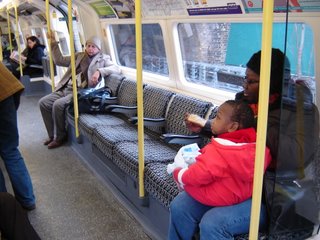
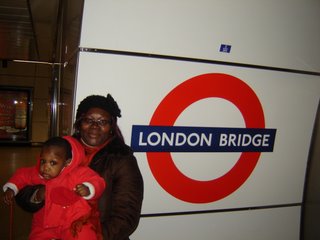
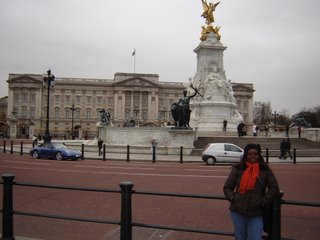
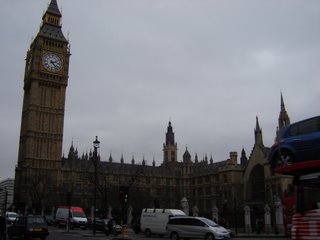
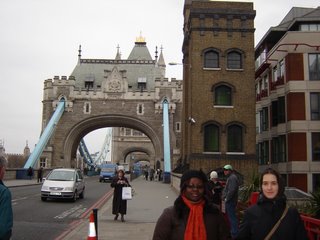
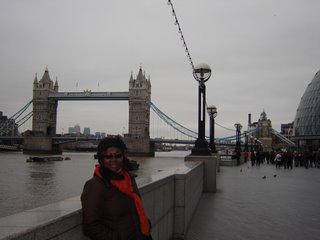
Lundi 20 mars 2006, London. Chacoun nous rendait visite de Paris. Trois jours en Angleterre. Tour rapide de quelques 'monuments' importants de Londres. Buckingham Palace, Tower bridge, Big ben, 10 downing street(les bureaux de Tony Blair) et le metro. Fidele a la legende, Londres etait sombre...et froide.
Saturday, March 25, 2006
Friday, March 24, 2006
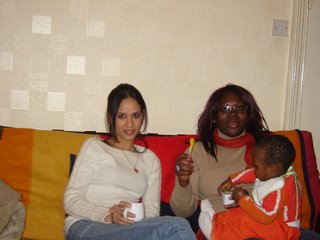
Monday, 20 march, 4 Ebbsfleet, London, At Osama's.
Girls, I know how much you care about your looks. It took me around 20 mns to choose this picture. I hope you will be happy with it.
Nahed, your picture with the palestinian flag around the neck didn't come out well. I know you liked that pic. Dont worry, you still look beautiful.

"Because many 'advances' have happened, we've lost the urgency-and that's just human nature-that we had before, when we couldn't vote, couldn't use mass transportation, or drink from the fountains".
"It comes down to this: black people were stripped of their identities when they were brought here, and it's been a quest since then to define who we are".
"Violence is a part of America. I don't want to single out rap music. Let's be honest. America's the most violent country in the history of the world, that's just the way it is. We're all affected by it".
Tuesday, March 21, 2006
Saturday, March 18, 2006
Friday, March 17, 2006
Thursday, March 16, 2006
Camera abuse

I confess. I'm driving Emilie mad with my digital camera. Her facial expression says it all. Poor thing:-(.
Hey! chut! She doesn't know she's on display here. She'll kill me if she finds out. I know she won't. Unless somebody tells her.
For the record, I've written down somewhere the name of the person most likely to tell Emilie. I won't be wrong. You watch.
Tuesday, March 14, 2006
Monday, March 13, 2006
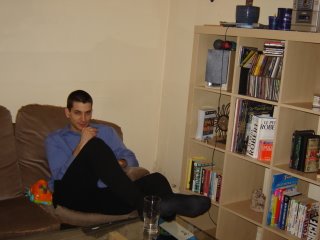
This is my mate remi. The technical brain behind my blog. One of the most patient persons I've ever come across. Why? He once tried to teach me the basics of the HTML language. He must have noticed right away that my brain wasn't properly wired to understand what he was trying to teach me(as he knows I struggle to learn a simple game). But he kept going and calmly telling me that it's so simple his daughter (15 months at the time) could understand it. And he tried relentlessly to drive the message home. At the end? I didn't get it:-). Well he's only human. He's not going to try for ever. So here I'm still relying on him. He tried hard to teach me how to fish instead of giving me the fish. No chance.
Friday, March 10, 2006
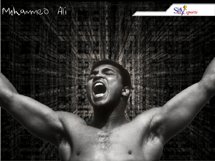
Understandably most people easily associate names such as Malcom X and the reverend King with the Afro-american civil rights movement. But Mohammed Ali was also at the forefront of the struggle. One of its most powerful symbols of defiance and pride.
"I know where I'm going and I know the truth, and I don't have to be what you want me to be. I'm free to be what I want".
"I am America. I am the part you won't recognize. But get used to me. Black, confident, cocky; my name, not yours; my religion, not yours; my goals, my own; get used to me". Mohammed Ali.
* Beaucoup, a juste titre, associent facilement des noms comme Malcom X et le reverend King au mouvement des droits civils Afro-americain. Mais Mohammed Ali etait egalement une des figures de proue de la lutte. Un puissant symbole de resistance et de fierte du mouvement.
"Je sais ou je vais et je sais la verite, et je n'ai pas a etre ce que vous voulez que je sois. Je suis libre d'etre ce que je veux".
"Je suis l'Amerique. Je suis la partie que vous ne voulez pas reconnaitre. Mais habituez vous a moi. Noir, sur de soi, arrogant; mon nom, pas le votre;ma religion, pas la votre;mes objectifs, les miens. Habituez vous a moi".
Mohammed Ali.
Monday, March 06, 2006
Saturday, March 04, 2006

Because they will enslave the black ones, steal the lands of the red ones, hunt the blue ones to extinction, accuse the yellow ones of not abiding by the rules of international business, scare their nations by saying that the green ones are going the invade the earth and complain that the brown ones take all their jobs. Why assume they'll do that? Because that is what they do. Why they do that? Well if you push it far, its simply comes down to human nature. The quest for power and control. How one uses it, is down to him/her.
But it doesn't answer the question: How one colour manages to subdue all the other colours? Think about it.
* POURQUOI N' Y A T IL PAS DE M&Ms BLANCS?
Parce qu'il feront des m&ms noirs des esclaves, voleraient les terres des m&ms rouges, chasseraient les m&ms bleus jusqu'a l'extinction, accuseraient les m&ms jaunes d'entrave au commerce, qu'il declancheraient la panique en faisant croire que les m&ms verts veulent envahir la terre, et se plaindraient que les m&ms marrons prennent tous leurs boulots. Pourquoi presupposer qu'ils feront cela? Parce que c'est ce qu'ils font. Pourquoi font ils cela? Si vous poussez la reflextion, vous comprendrez que c'est la nature humaine: La soif du pouvoir et du control. Chacun l'utilise comme bon lui semble.
Mais cela ne repond pas a la question: Comment une couleur arrive a maitriser et controler les autres? reflechissez y.
Abou Mazen


I once said to Abou Mazen: ' The first time I saw you, I didn't like you'. 'Why?' He replied. ' I don't know, I just didn't like you' I said.
Two minutes of silence.
'What made you change your mind?' He asked. 'Who told you I did? I answered. We were in stitches. We couldn't stop laughing for a good hour. Sitll a standing joke between us. A very sharp guy.
Mazen knows what I mean.


